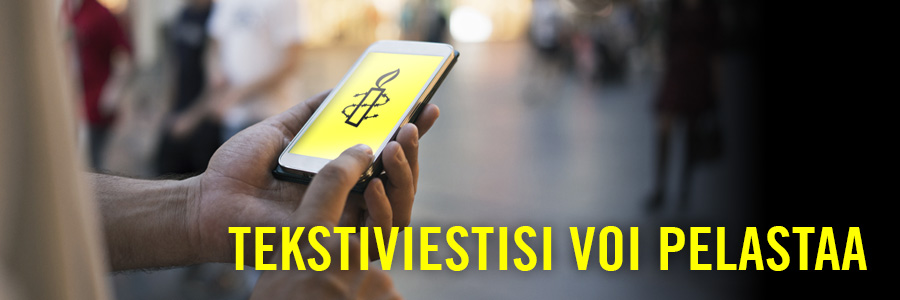Three men – Hadi Rostami, Mehdi Shahivand and Mehdi Sharfian – are at imminent risk of finger amputation. On 14 April 2025, officials informed them that a guillotine machine has been ordered to Urumieh Central Prison, West Azerbaijan province, to carry out their amputation sentences in the coming days. Convicted in 2019 after a grossly unfair trial and torture-tainted “confessions”, the men have faced repeated threats of amputation – a form of torture and a crime under international law. Previous plans to amputate their fingers were halted due to international pressure.
Vetoomusteksti
Dear Mr Gholamhossein Mohseni Ejei,
Hadi Rostami (38), Mehdi Sharfian (42) and Mehdi Shahivand (29) – held in Urumieh Central Prison, West Azerbaijan province – are at imminent risk of having their finger amputation sentences carried out. On 14 April 2025, the deputy prosecutor of Urumieh, in the presence of the head of the Office for the Implementation of Sentences, and the head of Urumieh Central prison informed them that judicial authorities have ordered a guillotine machine to the prison to implement their amputation sentences in the coming days. In March 2025, Hadi Rostami wrote a letter from prison with a plea for help, stating, “[Authorities] want to cut off my hand for a crime I did not commit. I call on human rights organizations, the United Nations, and the international community to take urgent action to prevent the implementation of this inhumane sentence.”
Hadi Rostami, Mehdi Sharfian and Mehdi Shahivand were arrested in 2017 and convicted of robbery in 2019 after a grossly unfair trial. They were denied access to lawyers during the investigation phase of their case and courts relied on forced “confessions” to convict them. The men have said they were forced to make the “confessions” under torture and retracted them during trial. According to informed sources, the men were tortured through being beaten, kicked, flogged with a cable and hung from their wrists and feet during interrogations. Hadi Rostami’s hand was broken; interrogators also removed Mehdi Shahivand’s trousers and threatened to rape him with a piece of wood if he refused to make “confessions” incriminating himself and the other two men. The authorities dismissed their torture allegations and failed to order investigations into them. According to their court verdict, reviewed by Amnesty International, they are sentenced to “have four fingers on their right hands completely cut off so only the palm of their hands and thumbs are left”. Since their conviction, they have gone on multiple hunger strikes to protest inhumane prison conditions and repeated threats to carry out their amputation sentences. Hadi Rostami has attempted suicide several times, including by swallowing pieces of broken glass, resulting in serious health complications for which the authorities denied him adequate medical care. In February 2021, the authorities flogged him 60 times in prison after convicting him of “disrupting prison order” in reprisal for hunger strikes.
Torture is a crime under international law. Iranian authorities are obliged, under international law, to prohibit and punish torture in all circumstances and without exception. Those responsible for ordering and carrying out the crime of torture are liable to criminal prosecution under international law.
I urge you to immediately halt plans to carry out the finger amputation sentences of Hadi Rostami, Mehdi Sharfian and Mehdi Shahivand, quash their convictions and amputation sentences and grant them fair retrials without resorting to corporal punishments. I urge you to protect them from further torture, give them access to any medical care they need and investigate their torture allegations, bringing anyone suspected of responsibility to justice in fair trials. More broadly, I call on you to abolish all forms of corporal punishment in law and practice.
Taustatietoa
Hadi Rostami, Mehdi Sharfian and Mehdi Shahivand were accused of breaking into the houses of four individuals and robbing safes containing gold and cash. On 19 November 2019, following a grossly unfair trial before Criminal Court 1 in West Azerbaijan province, they were sentenced to having their fingers amputated. Their trial relied on forced “confessions” which the men have said were obtained under torture while they were detained and interrogated without access to their lawyers in a detention centre run by the Investigation Unit of Iran’s Police (Agahi). According to an informed source, interrogators forced Mehdi Sharfian and Mehdi Shahivand to “confess” to committing burglaries in which they had no involvement and to implicate Hadi Rostami in the same burglaries. In a letter written to the Head of the Judiciary in September 2020, reviewed by Amnesty International, Hadi Rostami said that interrogators punched, kicked and beat him with various instruments. He also said one of the interrogators demanded that he sign a blank piece of paper and that he did so only when he reached the point of physical and mental collapse. He said that prosecution authorities subsequently added, without his knowledge and consent, the details of his charges to the blank paper to make it appear as though he had accepted the charges. All three men retracted their “confessions” during their trial and told judges they were made under torture, but both the Criminal Court and the Supreme Court failed in their obligations to exclude the “confessions” as evidence and order investigations into their torture allegations. The verdict of the Supreme Court, reviewed by Amnesty International, briefly mentioned in a few general words that Hadi Rostami had complained about torture, but did not provide any further analysis. Hadi Rostami has made numerous official complaints to judicial bodies which have been ignored. In March 2021, he complained to a representative of the Head of the Judiciary during his visit to the prison; the representative gave him false assurances that his case would be resolved. Hadi Rostami has also raised his case directly with the current Head of the Judiciary, Gholamhossein Mohseni Eje’i when he visited Ilam prison, Ilam province, while he was being held there, but to no avail. Previous plans by the Iranian authorities to carry out the three men’s amputation sentences between 2020 and 2022 were halted due to international pressure.
On 13 March 2025, the three men were summoned to the Office for the Implementation of Sentences in prison and given a letter from the prosecutor’s office in Urumieh stating that their amputation sentences could be carried out as early as 11 April 2025. Following this, in March 2025, Hadi Rostami wrote a letter from inside prison pleading for help from the international community: “I…have been imprisoned in Urumieh Central prison since 2017 on charges of ‘theft’ and sentenced to the amputation of four fingers on my right hand, despite my innocence… in a detention centre run by the Investigation Unit of Iran’s Police (agahi), I was forced to sign blank papers under severe torture. Even then, I continued to assert my innocence, but my voice was ignored…”
At least two other men – Kasra Karami and Morteza Esmaeilian – held in Urumieh Central prison are also under finger-amputation sentences in Urumieh Central prison. On 29 October 2024, the authorities carried out the amputation sentences of Kurdish brothers, Mehrdad Teimouri and Shahab Teimouri, in Urumieh Central prison. Afterwards, they transferred the brothers to a hospital outside prison for medical care. However, they returned them to prison within hours, despite their need for continued medical care, and held them in solitary confinement cells for several days while denying them access to healthcare.
The victims of judicial amputations in Iran are overwhelmingly from poor, vulnerable backgrounds. By deliberately maiming them, the Iranian authorities often leave them with fewer means to find work and sustain themselves, particularly in a society where people with physical disabilities face widespread discrimination.
Despite Iran’s obligations under international law, Iran’s Islamic Penal Code continues to provide for corporal judicial punishments amounting to torture, including amputation, flogging, blinding, crucifixion and stoning. According to Abdorrahman Boroumand Center for Human Rights in Iran, Iranian courts have issued at least 384 amputation sentences since 1979. The organization has also recorded the implementation of 223 amputation sentences since 1979. The Iranian authorities do not publish official figures of amputation sentences issued or carried out, and the real numbers are likely to be far higher. Iranian law requires that a physician be present during the implementation of corporal punishments, in direct violation of ethical guidelines and international standards which expressly prohibit health providers’ involvement in torture.


